


Syria’s First Lady &Islamic Countries Businesswomen Forum
"Our Islamic Heritage includes the rich history full of business initiatives and Learning; and the source of our empowerment lies in the unity, values and objectives of Islam. Many centuries ago, the Moslem Scientists have formulated our concept of Social Science; whereby the Islamic initiatives have contributed to the expansion of international trade. We have to be reunited again as to restore our great Islamic Heritage in Science, Research, and Invention. Through our work together, we can create the environment which develops the Youth minds, create real opportunities for our Youth inside the Homeland and abroad; together we can make of our Youth promising capabilities the reality of tomorrow," Mrs. Asma Al-Assad the First Lady of Syria said
In her welcome address to the participants in the Fourth Forum for Businesswomen in Islamic Countries, November 2, 2008, Mrs. Al-Assad added " I urge you to focus during your Forum on the issue of the Youth, who form more than 60 percent of the Moslems; they are the reality of today, and the promise of tomorrow," warning against the continued lack of skillful working power, where, for example, from the Arab World around 70 thousand University Students migrate every year, and were many of them never come back to their Homeland" Consequently, we lose not only their experience, the basic for the future of business, science and learning, but we lose their cultural and national understanding. We do need both and together as to formulate the development of our society securing its economic prosperity," noted Mrs. Al-Al-Assad.



Syria’s First Lady &WAM Interview
“The woman in Syria has become at the present time present and active in all fields and sectors of work. As far as politics, the Syrian woman has a very good experience and since a long time; the presence of a woman as Vice-President in Syria doses talk by itself, not to mention other important positions for decision making,” said Mrs. Asma Al-Assad, the First Lady of Syria.
Interviewed by the Emirates News Agency (WAM) on convention of the second Arab Women Organization conference, to be held in Abu Dhabi, 11-13 November, 2008, Mrs. Al-Assad added “We in Syria believe, for many decades, that the building of a balanced society capable of achieving growth deems an increase of women reaching to decision-taking positions, as to invest all of our available human resources potentialities. We have been working for this purpose. The woman at present is there with a wide participation, and in high level positions like Judiciary System, Economy, Scientific Activity, Information, as well as Armed Forces.”
“We are very keen on stimulating the popular base as to elect women for decision-taking positions at all levels,” outlined H. E. Mrs. Al-Assad asserting that “The issue of woman empowerment has been part and parcel of the 10th five-year Development Plan- 2006-2010-. This is a very important transitional point as far as the State shouldering of responsibilities in the field of woman advancement.”
“The Arab Woman Organization (AWO) adopts a clear-cut strategy with plans and projects. One main objective of the AWO is the creation of an Arab woman joint framework with institutional form; this guarantees the interactive exchange of experience,” noted H. E. Mrs. Al-Assad.
“To separate the problems facing woman from those facing society is a mistake; hence all that is related to the woman, whether positively or negatively, is related to part of the society; that is to the entire society, it is not possible to separate the part from the whole,” declared Mrs. Al-Assad pointing out “ the way is still long, where there are matters and challenges to be faced by us, women as well as men, with an open mentality, unattached to the past, and aware of the nature of the challenges and necessities of the Age. As to achieve this, all efforts, official as well as civil ones, have to be rallied.”
Her Excellency, Mrs. Al-Assad highly lauded the role played and efforts exerted by Her Highness Sheikha Fatima bint Mubarak, chairwoman of UAE General Women Union and Chairperson AWO as far as the Arab women issues are concerned.
Edited & Translated by
Mohamad Abdo Al-Ibrahim
Rome, November 9, 2008.



Syria’s First Lady &Arab Woman Organization Speech
Her Excellency Mrs. Asma Al-Assad, the First Lady of Syria, underlined Tuesday, November 11, 2008, that the empowerment of the Arab Woman is never to search for a different role, but is to create an advanced modern society; where the values of real citizenship prevail. The empowerment of the Arab Woman is an issue for the present as well as for the future of the whole society, upgrading life in defense of justice, security, freedom as to keep the Homeland second to none.
Addressing the Second Conference of the Arab Woman Organization (AWO), held under the motto: 'Women in the Concept and Issues of Human Security: Arab and International Perspectives", in Abu Dhabi, H. E. Mrs. Al-Assad said " The Homeland is not to be secure, if half of the society- Women- were to be insecure," calling on the Arab Women to have the courage of demand, determination of joint struggle with those who believe in the human citizen with no discrimination, for the sake of their cause; hence their struggle for the cause of their Homeland is but the struggle for the Homeland itself.
The First Lady of Syria pointed out that Water Security is but the other side of Life Security worldwide, especially in the Arab World in light of the conditions under which our region lives, amid the continued Israeli occupation and persistent robbery of Arab Water resources: Palestinian, Lebanese, Jordanian and Syrian, with all of what this robbery constitutes of hindering development efforts, not to mention their catastrophic consequences upon human security conditions with all of their aspects. Mrs. Al-Assad asserted that under no circumstances, could separation be made between the continued Israeli occupation of the Arab territories, the disregard of the Palestinian rights, and the status of Arabs Security, men and women together.



The Syrian First Lady &The Sunday Times Interview
“Peace is still an objective for us. Without it, no matter how much we prosper economically, we won’t be able to realise the future that we’re looking for.”
Margarette Driscoll
It doesn’t take much to cause ripples in a staid Arab society, so the impact on Syria of its British-born first lady, Asma Assad, has been nothing less than seismic. From the moment she married the country’s president, Bashar al-Assad, eight years ago, she threw away the rule book. The first thing she did, for instance, was to disappear from public view.
When she surfaced, three months later, it turned out she’d been travelling around the country incognito – in T-shirt and jeans – wanting to assess Syria’s problems for herself and get to know people before they had any preconceived notions about her. “For me,” she says, “it was only logical – that was the way to start.”
Back in Damascus she held a reception and astonished her husband’s ministers by mingling and introducing herself to everyone instead of gathering them around a long, formal dinner table with herself and her husband at the head.
Her warm, informal style has persisted, despite the muttered disapproval of the old guard, formed under the rigid regime of Bashar’s father Hafez al-Assad. It was very much in evidence last week, on a visit to the Massar education centre in Lattakia, northern Syria – one of her pet projects – where she slipped quietly into the back of a room in which teenagers were discussing the internet (including their belief that their government blocked certain sites) and ended up in a spirited debate.
Afterwards she stopped to talk to a group of little girls, shaking hands and kissing each one in turn. The parallels with Diana, Princess of Wales were inescapable: listening to one of the children play the piano, she told the entranced remainder that the music made her want to get up and dance. “They looked at me and said, ‘Me too, but we didn’t want to say’,” she laughs.
The analogy with Diana does not run much further, though. Our golden girl was 19, naive and self-confessedly “thick as a plank” when she married the Prince of Wales. Assad, 33, the daughter of a prominent cardiologist, grew up in Acton, west London, left Queen’s college, an independent school in Harley Street, with four A-levels, including maths and economics, and got a first in computer science at King’s College London.
She spent two years at Deutsche Bank, then joined JP Morgan – where she specialised in mergers and acquisitions – working for nine months in the bank’s Paris office and for 18 months in New York. She talks fluently of Syria’s economic situation and the overhaul of its education system.



The Syrian First Lady / CNN Interview
“The Israeli barbaric assault on innocent Palestinian civilians has been horrific,” said Her Excellency Mrs. Asma Al-Assad, the First Lady of Syria, echoing the call as “Again, give peace a chance”.
Mrs. AL-ASSAD: “Three hundred million people live in the Middle East, of which 60 percent are under 25. So, we have an opportunity, and we have a challenge. The opportunity is to make sure that they believe in the future, that they see it as an exciting opportunity, that they feel that they’re able to contribute, to get involved …. The reality on the ground is increasingly going further and further away from that, and it’s not just the Palestinians in Gaza. It’s increasingly affecting all of us. And, for us to see people suffering is, if anything, weakening the voice of the moderates and empowering the voice of the extremists.”
Mrs. AL-ASSAD: “The Israeli barbaric assault on innocent civilians - innocent Palestinian civilians - has been horrific. … Gaza is a prison. It’s been a prison for three years. The embargo that has affected people’s lives has almost devastated the Palestinian community. Eighty-percent of the Palestinians in Gaza rely on food aid. They rely on humanitarian aid not just to live, but to survive. One million people in Gaza - Palestinian people - are without electricity. … This is the twenty-first century. Where in the world could this happen? … As a mother and as a human being, we need to make sure that these atrocities stop.”
Mrs. AL-ASSAD: Just imagine your children living in Gaza. How could that reality be? Let's talk through the scenario.
You wake up in the morning, you feed -- you give your children a glass of milk. Mothers in Gaza can't do that. But why? Because no milk gets through.
You send your children off to school knowing that they'll be safe, knowing that they're going to get a good education. Mothers in Gaza don't do that. Children don't go to school because it's not safe, because -- it's just beyond belief, to be honest.
You cook a meal. Mothers in Gaza can't cook. Why can't they cook?
Because they don't have access to fuel. They don't even have access to the basic food stuff (ph) that is required to get a meal together. So children don't eat.
Mothers -- think about when you put your children to bed at night. This is something I think on a daily basis. You put your children to bed at night and you expect to see them in the morning. That's a luxury that people in Gaza just do not have.
So what would it have been like for you having -- living under those circumstances? That is something that we just cannot survive and wait for it to stop.
CAL PERRY, CNN INTERNATIONAL CORRESPONDENT: Let me ask you this, are you sad? Are you frustrated? Are you angry? I mean, you have to go to these meetings, you have to go to these dinners. Is it difficult with what's going on?
Mrs. AL-ASSAD: It's been difficult to smile, and that's not just me, it's a lot of people that I'm meeting, it's a lot of people that I'm talking to. It's the U.N. agencies on the ground that are seeing some really horrific things.
The stories of the psychological trauma that we're not hearing on our TVs, we're not seeing on our TVs and we're not reading in our newspapers. It's something that's going to have a long-term effect on life not just in the region, but actually in the global community that we all live in, because when you see people suffering like this, it doesn't give you a sense of optimism, it doesn't give you a sense of hope. If anything, it pushes you to become more desperate, and when you are desperate, you have nothing to live for.
PERRY: Now, the Israelis say they're protecting themselves, right to self-defense, they're under bombardment of missiles, their children are under threat.
What's your response to that?
Mrs. AL-ASSAD: Lift the embargo. Lift the embargo. It will -- lift the embargo and engage in a peace process, a real process.
As you said, talk is cheap. It's not enough to say that we want peace.
What are you going to do to achieve peace? What we're seeing on our TV is not a step in the right direction.
PERRY: Do you have any optimism for the future, in the near future?
Mrs. AL-ASSAD: You have to remain optimistic. You have to remain -- you have to try and keep working towards your goals and objectives, otherwise you get sucked in with everything else that's going on. So, yes, you have to.
It's difficult, especially at times like this, that you have to keep looking in the direction that you want to go. You have to keep not just looking, you need to keep working towards it, to be honest. And you need to grab every opportunity, every platform, every exchange, every experience to work towards the agenda that is set, and that is peace.
Again, give peace a chance
The Source: CNN
 Interviews
Interviews speeches
speeches National
National International
International Speeches in Arabic
Speeches in Arabic They Said About The President
They Said About The President Domestic
Domestic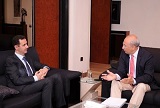 News And Analysis
News And Analysis Pictures
Pictures 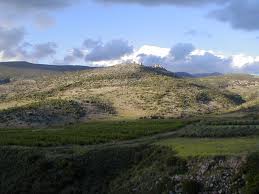 Golan
Golan الجولان بين مطرقة الاحتلال و سندان التلوث
الجولان بين مطرقة الاحتلال و سندان التلوث

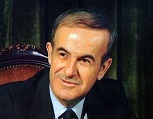 Interviews
Interviews Speeches
Speeches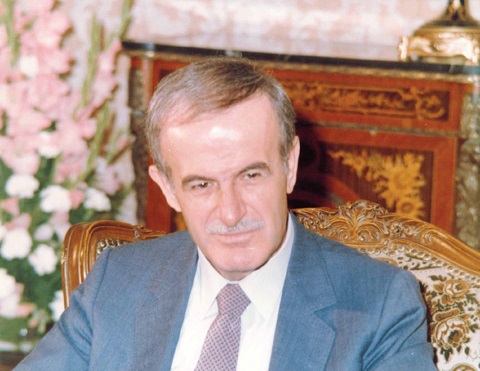 Words
Words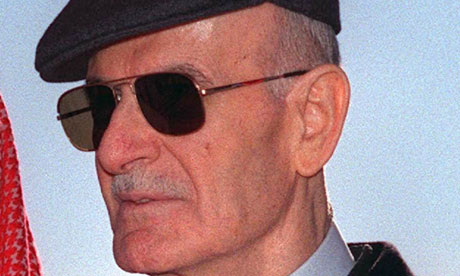 Pictures
Pictures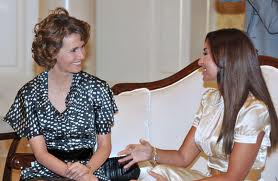 News
News  Excerpts from Mrs. Al-Assad Statements
Excerpts from Mrs. Al-Assad Statements CV
CV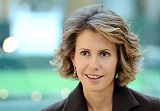 Pictures
Pictures